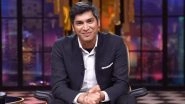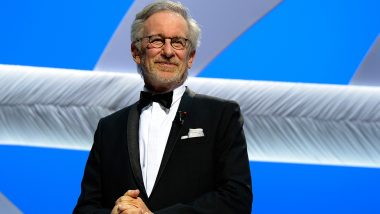Filmmaker Steven Spielberg was ashamed of a lot of things while growing up, and says he was bullied for being Jewish in his school. "Well, you know, being Jewish and being raised additionally in the area where there weren't a lot of Jews, New Jersey was fine, there was no problem, then I moved Westin, I encountered anti-Semitism as an elementary school student in my school, and not throughout the entire school but small parts of popular kids they would pick on less popular kids, in my case zero popularity, growing up," Spielberg said while recalling his personal story of hate that he encountered. Steven Spielberg Wraps Up West Side Story Remake, Writes an Adorable Thank You Letter for the New Yorkers.
"I didn't think of it as hate but thought of it as a shame. I was ashamed of lot of things and they actually managed with enough chiding and bullying to make me actually feel ashamed of being Jewish. I felt pretty much like an outcaste and when I got older, I realised bullying is a very pervasive tool to make other people feel like they are empowered," he added. The director also said: "So, I was on the other receiving end of people's power trips and that was my main experience with being hated, something that I had no control over and something that inside me, I have always been very proud of to be a Jewish." Shabana Azmi Roped in For Steven Spielberg’s ‘Halo’
Spielberg has got together with Alex Gibney to explore the emotion of hate with Discovery Channel's series "Why We Hate". They have produced the show. Directed by Geeta Gandbhir and Sam Pollard, the show goes deeper into social issues like understanding of the concept of hate. It also looks at how as individuals we are capable of evading the expression of hate by realising the after effects of the same.
During an interview with TVN International, a channel of the Discovery network, Spielberg and Alex Gibney discussed the show and their journey of creating the series. The show follows individuals seeking to quell violent conflicts, and allows viewers to consider lessons from some of the most brutal and enduring examples of hate throughout the world. Opening up about the most moving story, Spielberg said: "We overlook people who perpetrate evil to not view them like monsters, they don't have that point of view, the perpetrators of great evil until they are caught while they are in process of mass murder. It is the banality of people.
It's in industry, the holocaust, the genocides have been industrialised. Especially the holocaust, so many lives can be taken so quickly in such massive quantity. It was a business of death. It was run like, you would run a steel factory, a mill of some kind. And it was perceived by the perpetrators as being normal." With the series, Spielberg hopes "to achieve that anything involving hate can never be normalised".
"There has to be a kind of objective overview of hate. This documentary series attempts to show this must never be considered a normal thing and also that the brain is very supple, amazing organ and the brain is very pliable, very elastic even though the front of cortex stops growing when you are 25 years old. The brain can change, it's a changeable system, which it centrally means that hate can be unlearned," he said.
If you want to find hope somewhere, where to look for it? "I would love that every episode ends with hope. Every single segment of the series has solutions so its not just condemnation of those who hate and those who are essentially are them versus us. There is a middle ground. You know when I am really hoping that people will see it when see this series that the middle ground just happens to be about one thing -- creating conversations, talking about the things we share in common and not just the things that divide us. They will bring eventually people together," he said.
(The above story first appeared on LatestLY on Oct 20, 2019 05:20 PM IST. For more news and updates on politics, world, sports, entertainment and lifestyle, log on to our website latestly.com).













 Quickly
Quickly


